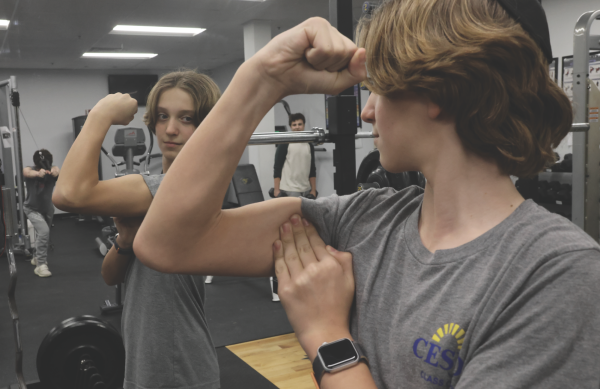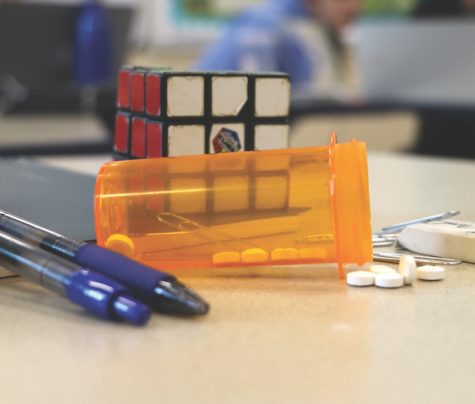Behind the Mask: Delving into mental health during the pandemic, understanding how to cope
February 1, 2021
Since the pandemic began, many teens have tried to maintain normalcy in their lives. Teens can feel very anxious or depressed at times, and the pandemic has only enhanced these emotions. This causes mental health conditions to greatly increase in teens who have diagnosed and undiagnosed conditions.
Mental illnesses are more prevalent in teens and young adults as opposed to adults. According to the National Institute of Mental Health (NIMH), in 2019, 29.4% of teens and young adults suffered from mental illnesses, whereas only 14.1% of adults above the age of 50 suffered from mental illnesses.
Jamie*, a CESJDS student diagnosed with depression, generalized anxiety disorder and attention deficit hyperactivity disorder has experienced more mental health struggles since the pandemic began.
Jamie said that pre-COVID-19, their depressive episodes were less frequent but more noticeable because they were more happy overall. Jamie said their mental health has taken a huge toll on their academic performance by affecting their ability to turn in assignments, and it has also impacted their family dynamic.
“I think that my family tries to be really sympathetic and helpful, but at a certain point my parents need to make sure I’m passing my classes and make sure I’m alive, and happy and well. So, that’s definitely been a big stresser on my family,” Jamie said.
Defining Mental Health
A study conducted in May by the National 4-H Council and a Harris Poll that surveyed about 1,500 teens showed that 7 out of 10 teens struggle with mental health conditions, and 55% of the teens said they suffer from anxiety. In the same study, 43% of teens admitted to struggling with depression.
Although many people are struggling due to the absence of normalcy from COVID-19, there is a clear distinction between general struggles and diagnosed mental illnesses. According to the National Alliance on Mental Health (NAMI), “a medical professional determines a diagnosis by interviewing you about your history of symptoms.”
“What [clinical psychologists] consider clinical depression is something that your mood is interfering with your ability to function adequately everyday so being able to function in school, being able to function at work, being able to function in your family,” clinical psychologist for the San Antonio, Texas Clarity Child Guidance Center clinical psychologist Dr. Cynthia Díaz de León, said.
Impact of COVID-19 on Mental Health
The sudden shift into quarantine and isolation resulted in many teens experiencing depressive and anxious thoughts. Many teens are still struggling with this dramatic adjustment and are worried about loved ones being exposed to COVID-19, grades falling or maintaining relationships without being able to interact with others.
“I think for some it’s adjusting to just the change and difficult circumstances and maybe bounce back,” guidance counselor Rachel Soifer said. “For others it’s sort of sliding into some depressive or anxious symptoms that are going to need a little bit more attention and [may be] a little bit longer lasting.”
According to Díaz de León, 1 in 5 people will experience some sort of mental illness in their childhood, but since the pandemic began, 1 in 3 kids said they feel more depressed.
“Here, what we saw at the clinic the first few months, at the end of last school year, people were irritated and frustrated, but I don’t think we saw people feeling depressed like we are now,” Díaz de León said.
Repercussions of Isolation due to COVID-19
It is not surprising that teens are dealing with many more mental health issues, as their lives completely changed overnight. Almost instantly, teens went from socializing with classmates all day to only interacting on social media.
Rachel Larkin, Director of Crisis Prevention and Intervention at EveryMind and the Montgomery County Hotline, which is affiliated with the National Suicide Prevention Lifeline, says teens need to spend time with their peers in order to grow. Without having social interactions or being able to celebrate milestones, teens have found themselves increasingly isolated.
“This is the time young people should be developmentally with their friends and exploring their social identities, and when you can’t do that you’re missing something that’s really important in your life, and that’s hard too,” Larkin said.
Isolation has also caused unhealthy schedules, including bad sleeping patterns and a lack of exercise. Students no longer commute from class to class or go outside during lunch because everything can be done from a chair or desk at home.
“What we see though is kids kind of struggling to tolerate Zoom for so many hours, and kids getting kind of off on their sleep schedule, [and] having trouble keeping up with work,” Soifer said. “The symptom presentation has increased in a very plain and obvious way.”
Teens who suffer from loneliness and depressive thoughts find it very hard to cope and many have turned to suicide as an option.
Specifically, Montgomery County has seen a 49% increase in the number of suicide hotline calls. Larkin encourages teens to take advantage of the hotline, regardless of their level of depression, so teens can connect with each other and have someone to talk to.
“You don’t have to be suicidal to call us. You can just be having a bad day or need to vent or be concerned about someone else,” Larkin said.
How to Help
According to Jewish text and English teacher Grace McMillan, staying connected and reaching out to friends is important especially while facing isolation.
“It’s also important especially for kids who need to be more isolated, talk to your friends. … Even if you can’t be in person with them, staying connected with friends is really important,” McMillan said.
While friends are a good outlet, Larkin emphasizes the extreme importance for parents to pay attention to their child’s mental health. Sometimes parents find it hard to relate to their child, but Larkin says it is still important to try and understand their point of view.
“Your generation has to be good at everything, and there is so much pressure to go to college and be well rounded and that’s an intense amount of pressure for any person, even a young person, to handle,” Larkin said. “I think parents need to be aware of that and take a step back and see how that can be affecting mental health.”
Additionally, Larkin suggests parents should strive to create an open environment at home. According to Larkin, having a parent’s support and a comfortable place to share how they’re feeling is crucial for teens at this time because it allows them to feel less alone.
“Don’t hammer it home but kind of come around and be like, ‘You know you still don’t seem yourself, what do you need? What can I do for you?’ … It’s reflecting that you see a problem and that you care,” Larkin said.
According to Larkin, another person who can help a struggling teen is themselves. Larkin encourages teens to reach out to friends and family if they are struggling, create safe and supportive environments by surrounding themselves with supportive people and most importantly, take good care of themselves.
“People eat right and exercise and take vitamins everyday to keep their body healthy. … Mental health should be treated the same way,” Larkin said. “You can do the equivalent of exercising, eating right [and] vitamins — by doing self care and asking for needs and finding resources.”
For people with diagnosed mental illnesses, Díaz de León recommends talking to trusted people, monitoring one’s feelings and developing effective coping strategies.
“What do I do when I start to feel like I’m going downhill? What’s my first step? Do I talk to somebody? … Do I let my doctor know? So having a safety plan or some sort of a plan of what your next coping steps are will be important,” Díaz de León said.
For Jamie, therapy has been an important part in helping their mental health. Previously, Jamie had a private therapist, and now they participate in a more intense program, including family therapy.
“I think that I would be doing a lot worse without therapy, as much as I hate to admit it, … it definitely has made a pretty big impact on my mental health,” Jamie said.
Throughout the worry and uncertainty, McMillan says it is always good for people to surround themselves with comforting thoughts. She recommends teens realize the skills and qualities COVID-19 has taught them and how they can grow from this experience.
“[COVID-19] will teach this generation resilience in a way that not every generation learns. And I know as an adult that resilience is a really, really, really important mental health skill,” McMillan said. “And I hope that students are able to recognize this is really painful, and this is really hard, but in the end, I will have learned … that I can get through it, and it will be okay.”
*Name has been changed to protect the student’s anonymity.














